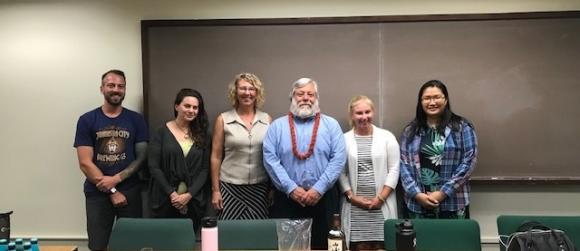
Professor Steve Gold with his Administrative Law students in Hawaii.
Professor Steve Gold spent his summer in a place many would find enviable—Hawaii.
But he wasn’t there on vacation, he was the visiting scholar in residence at the University of Hawaii at Manoa, as part of the school’s environmental law program.
Two professors were selected nationwide through a competitive application process and Gold was one of them. As part of his fellowship, he taught a summer course in administrative law to students and was also able to do research in his areas of specialty—hazardous substances and toxic tort scholarship.
“I brought something new to their environmental law program,” he said. “Hawaii doesn’t have a legacy of dirty industries or toxic superfund sites.”
He learned about Hawaii’s environmental concerns, including air pollution, endangered species, and water supply protection. While meeting with colleagues and getting to know people at the law school, he said he heard about environmental plights affecting the island state, including climate change, energy sources, and protecting coral reefs.
“I got to interact with other environmental law colleagues,” he said. “It was very informative.”
At the law school, Gold said, he also gained insight into his teaching methods from the feedback he received from his Administrative Law students. The course was very intense: two credits condensed into just five weeks of classes.
While studying about Hawaii’s environmental challenges, he learned that the state is committed to renewable energy and supports solar panels, geothermal energy, and energy involving the wind and tides – depending on the particular situation of each island. With a group of volunteers sponsored by the law school’s Environmental Law Program, he also toured and helped plant trees at a national wildlife refuge that provides habitat for several endangered species of birds found only in Hawaii.
In Hawaii, climate change and other environmental dangers have disproportionately affected the indigenous population of the area, Gold said, “Seeing environmental injustice in action in Hawaii, and interacting with different kinds of people, made the need to protect the environment and promote environmental justice more vivid.”